Women speak out in Parliament against detention, deportation, privatisation and profiteering 14 January 2010
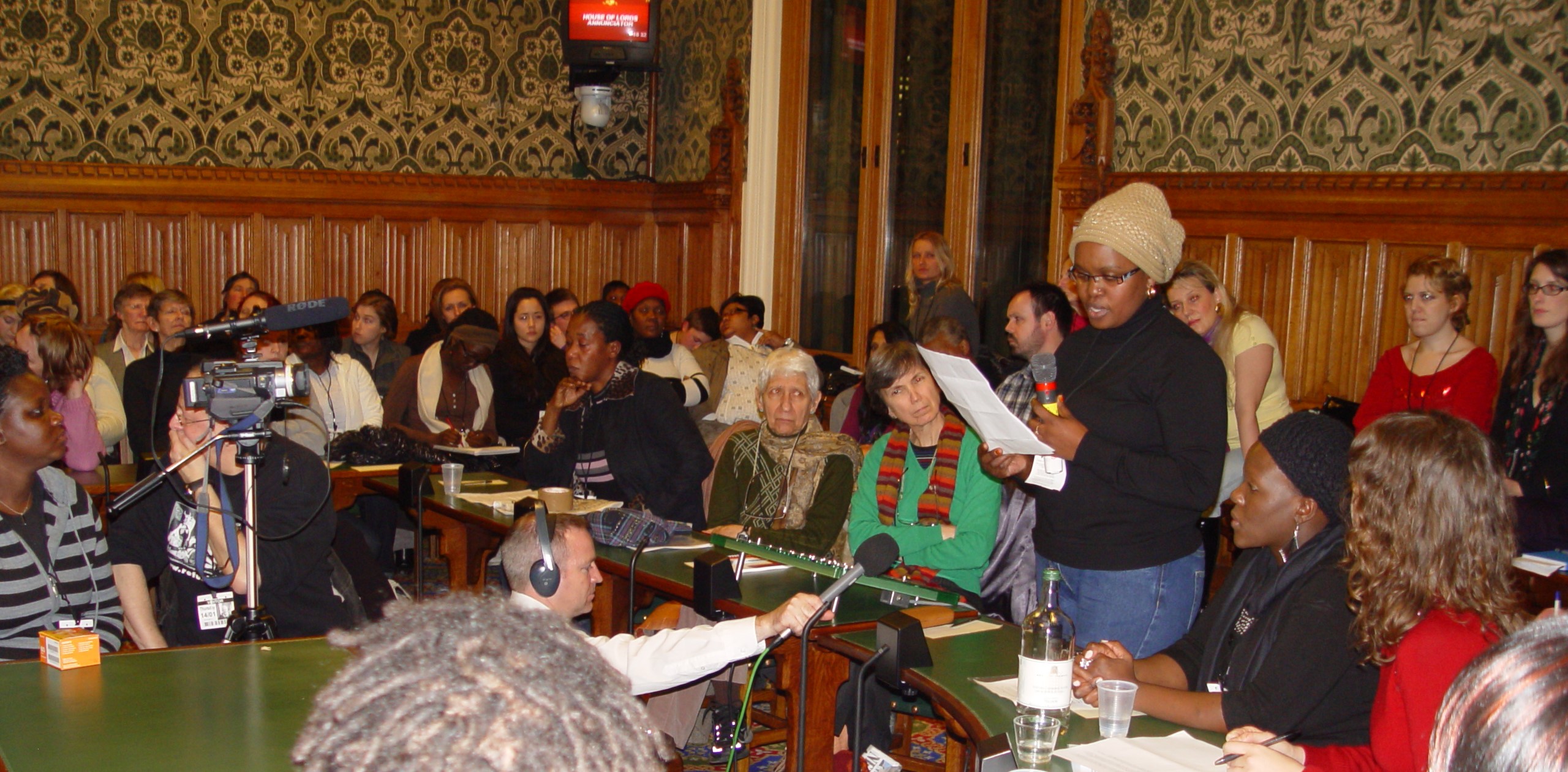
With recent press coverage shedding light on the devastating impact of detention on children, and the public outrage that followed, it was no surprise that a meeting on the detention of mothers and other vulnerable people in the House of Commons 14 January, was packed with over 150 people squeezed into all corners of the room.
Organised by the All African Women’s Group (AAWG) and Black Women’s Rape Action Project (BWRAP) with the help of John McDonnell MP, the meeting heard from nine women recently released from Yarl’s Wood Immigration Removal Centre. They graphically described the conditions they suffered as well as the resistance they organised through hunger strikes, public protests and day-to-day direct action. They talked about acting together and not apart, to force a change.
“Asylum – a struggle for justice versus an industry?”
Describing how women seeking asylum are up against the profiteering of companies and, in some cases, voluntary organizations which are contracted by the government to run asylum services, Cristel Amiss from BWRAP laid the groundwork for the meeting by saying. “On the issue of asylum there are two approaches: one is a struggle for justice and one is an industry for profit and lucrative careers. We are here to strengthen the struggle and expose the industry which often stands in the way.”
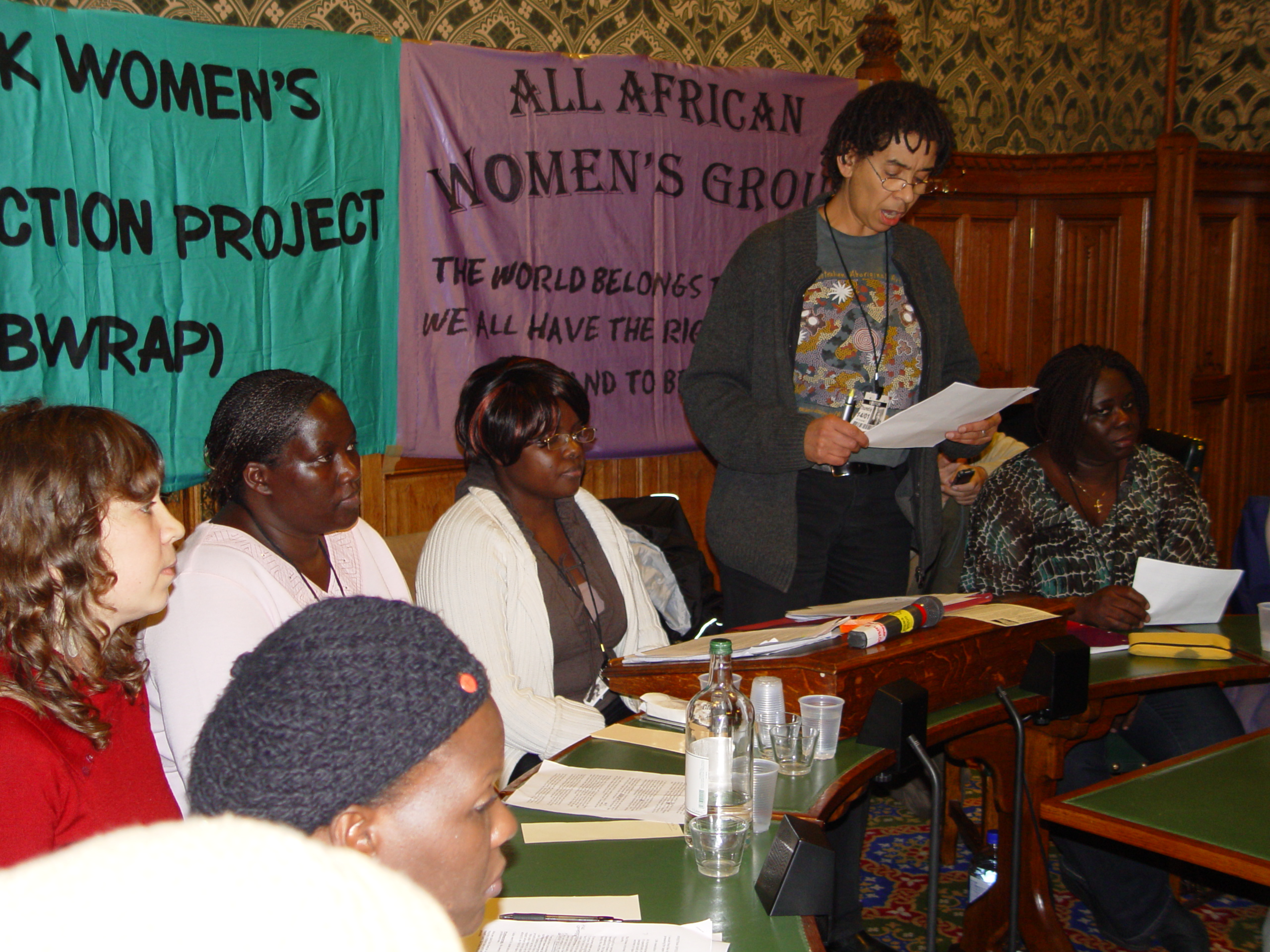
Condemning the way in which “both Conservative and Labour seem to parrot the BNP” and use the issue of immigration “to fuel racism” Ms Amiss said “we cannot allow ourselves to be divided in this way.” more
“Coming together for self-help”
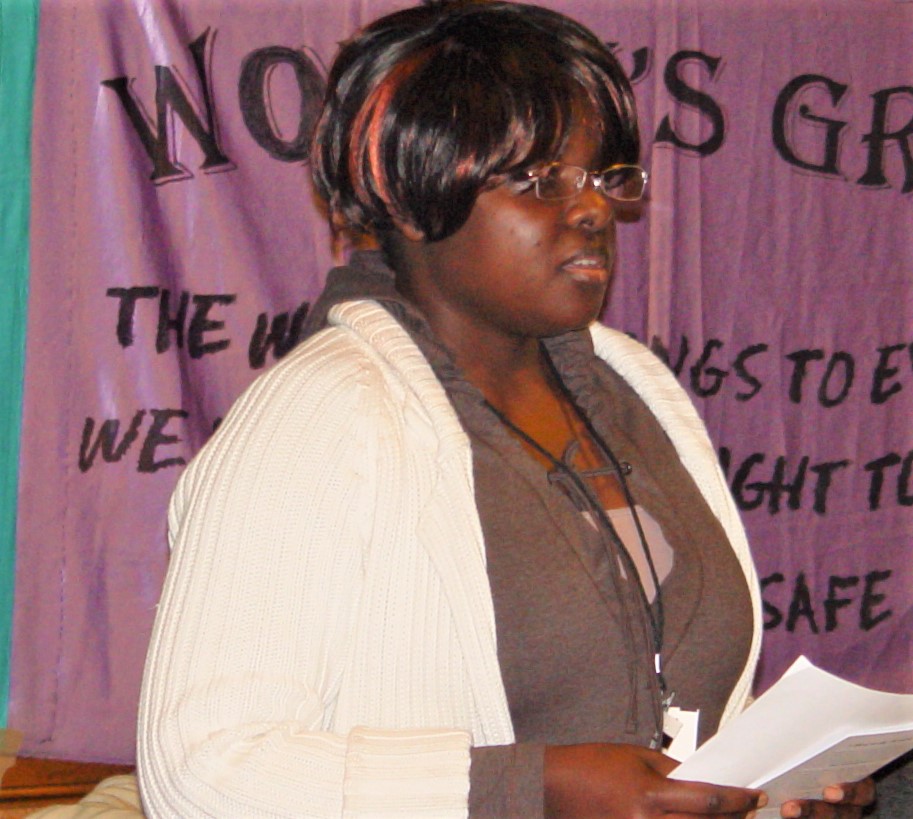
Co-chair Maria Kassaga, (AAWG) described how the AAWG brought together women who "may come from different sides of a political conflict” but worked together “because we cease to think of ourselves as rivals but as people going through the same experience.”
She spoke about co-ordinating a daily rota of volunteers taking calls from women in detention, and how information about their rights and the strength of their self-help group “gives women strength, encouragement and confidence to fight.”
Informed by her own experience of being deported from the UK, when she was handed straight over to the authorities at the airport to suffer further rape and other torture, Ms Kassaga called for a “public inquiry into what happens to the women, children and men who are sent back”, concluding: “This is evidence against claims that we are bogus.” more
All African Women’s Group, founded in 2002, is a group of women of different nationalities from different backgrounds. We may sometimes come from different sides of a political conflict but we have managed to stay together because we cease to think of ourselves as rivals but as people going thru the same experience. The problems we have unite us.
We are helped in that we are a self-help group so women are expected to be active on their own case as well as being ready to help others.
With BWRAP, LAW and WAR we co-ordinate a daily rota of volunteers taking calls from women in detention and working on our own cases. Many of us who do this work have been detained ourselves. So we know the fight women make from our own experience as well as from the position of helping women in this way.
What initially prompted this meeting was that we couldn’t get hold of women inside and we thought it unacceptable that women in detention should be isolated from life-saving support.
Most importantly women in detention are up against a regime determined to stop us from organising and associating with others. That is why the work we do informing women of their rights, using a copy of LAWs Guide (a copy gets sent to every woman in detention who is in touch with us) is so crucial because it gives women strength, encouragement and confidence to fight. Our group which can call on the support of other groups at the Centre gives us individually the strength to carry on.
Much of our experience is very hidden. In Africa and in the other countries we came from we organised for survival and change. When faced with persecution we organised to save our lives and the lives of our family and get to the UK. This achievement is never acknowledged. It requires mental and physical courage and we have to do this at moments when we may be traumatised by what we have suffered including death of loved ones and torture.
What is also hidden is what happens to us when we are sent back. I know this from personal experience and we have kept in touch with women after they have been removed and know that some have been raped or tortured in other ways. This is evidence against claims that we are bogus and don’t have the right to be here. As Cristel said we want action to come out from this meeting and one of our central demands is an enquiry into what happens to the thousands of women, children and men who are sent back.
“My life was decided in 10 working days”
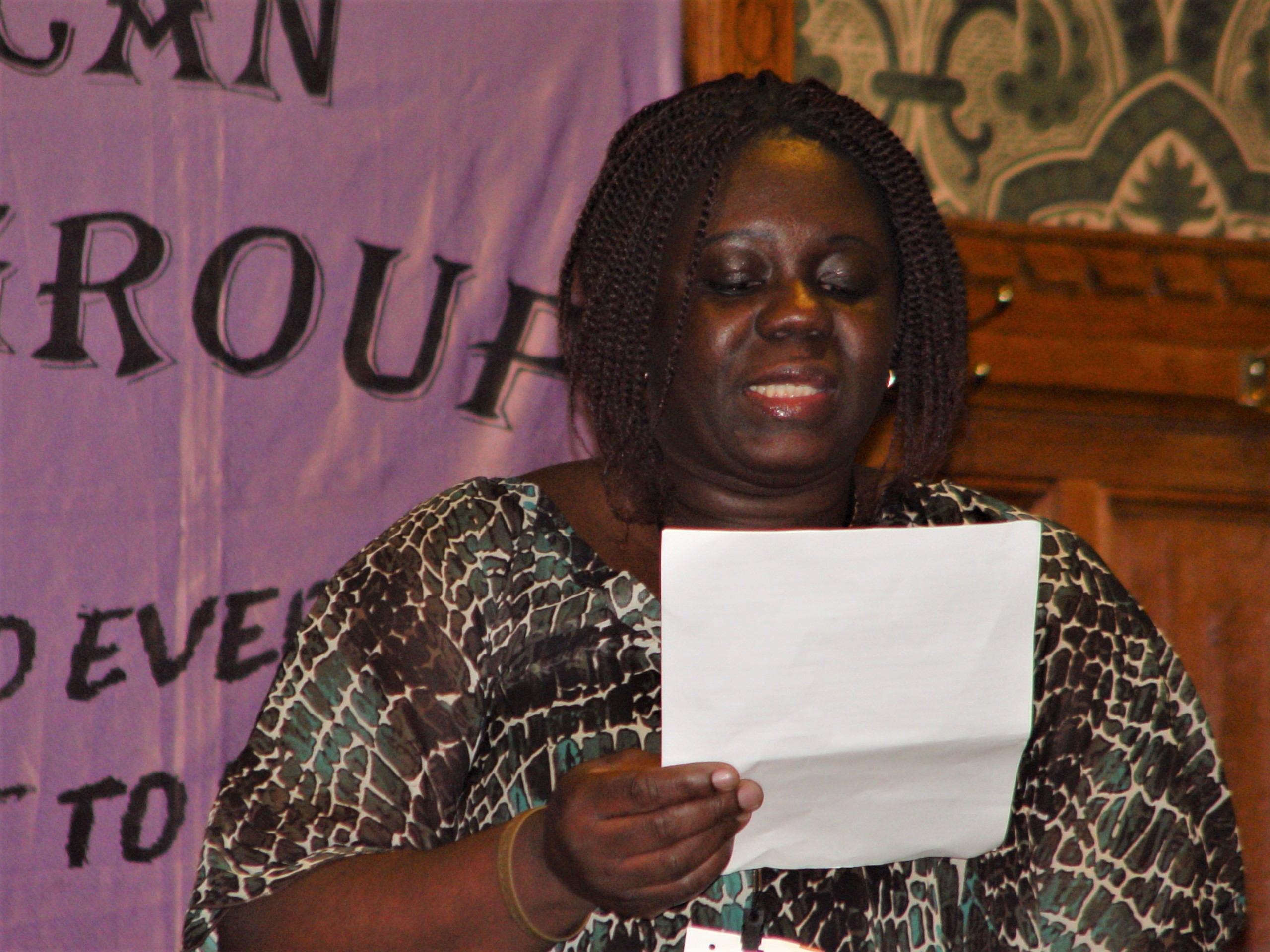
Isata Denton Ceesay, a lesbian woman and mother of four children who was sentenced to death in Gambia under Sharia Law, spent six months in Yarl’s Wood. Shocked by the injustice women and children faced, she complained: “Even convicted prisoners have time limits but in detention there are none. There are no proper translators so many women come back with papers they cannot read, and we can’t even tell them that their appeal dates have passed. Heavily-pregnant women are forced out of the country, some without removal directions.”
She called for the end of the “fast track” process which denied her time to gather crucial evidence or even find a solicitor. “My life was decided in 10 working days.” Despite the strength of her own claim, she got no help until she spoke to women at the Crossroads Women’s Centre. She appealed to those who got released to “fight for those who are left behind – we are their voice in the outside world.”
“Our role as mothers is not recognised, we are central to the community.”
Jaila Seremba was detained in Yarl’s Wood IRC for two months with her young children. She and other women went on hunger strike to protest at the life-endangering lack of health care for their children. “Our role as mothers is not recognised. My son had a temperature and needed treatment. They didn’t believe me”. She also described how women are deliberately isolated from support. “Everyone is supposed to be given pagers so they can be contacted, but some women are never given them and some don’t work. Sometimes women are prevented from faxing information even if they have removal directions”
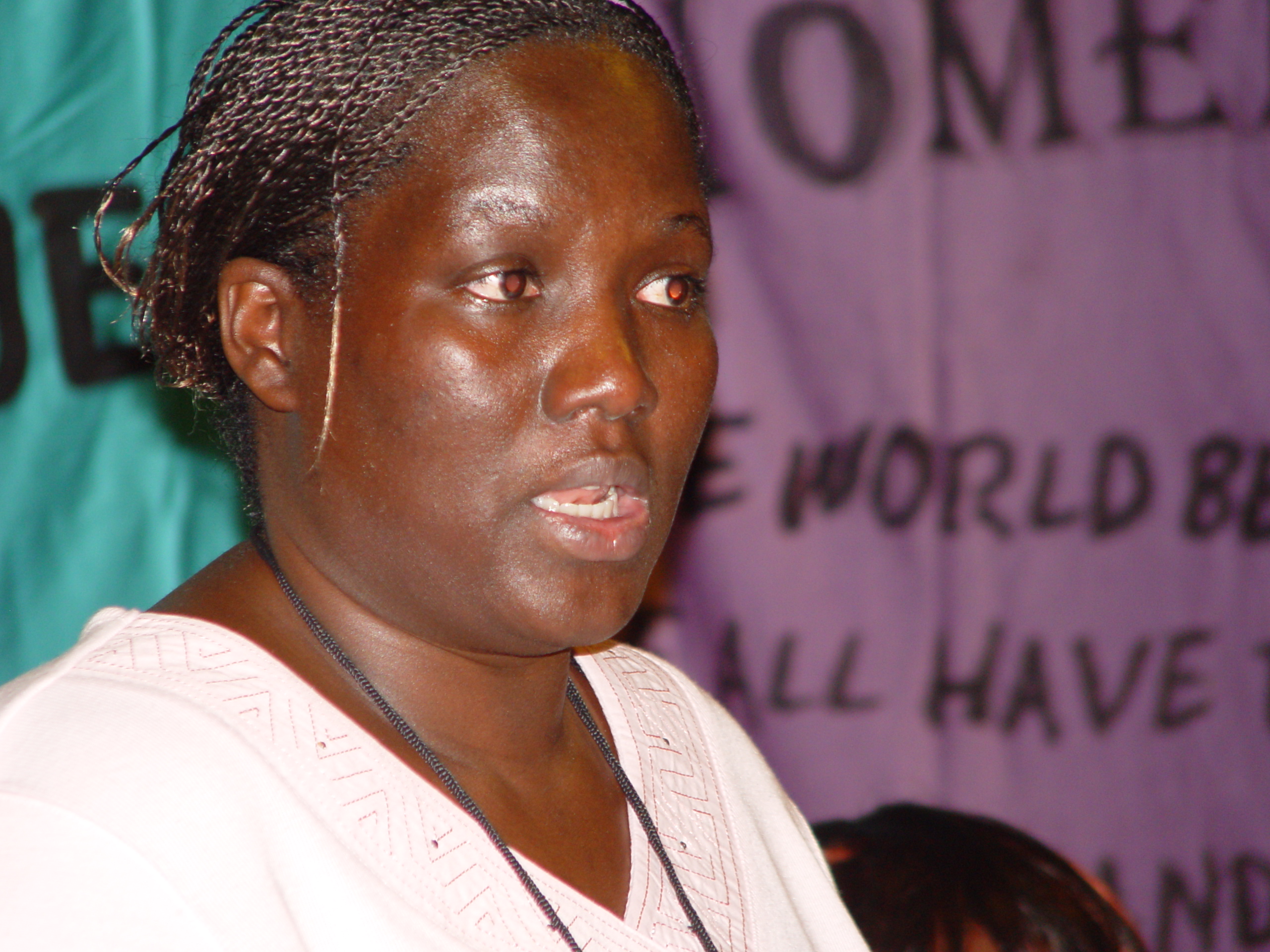
“Obstructing detention and deportation”
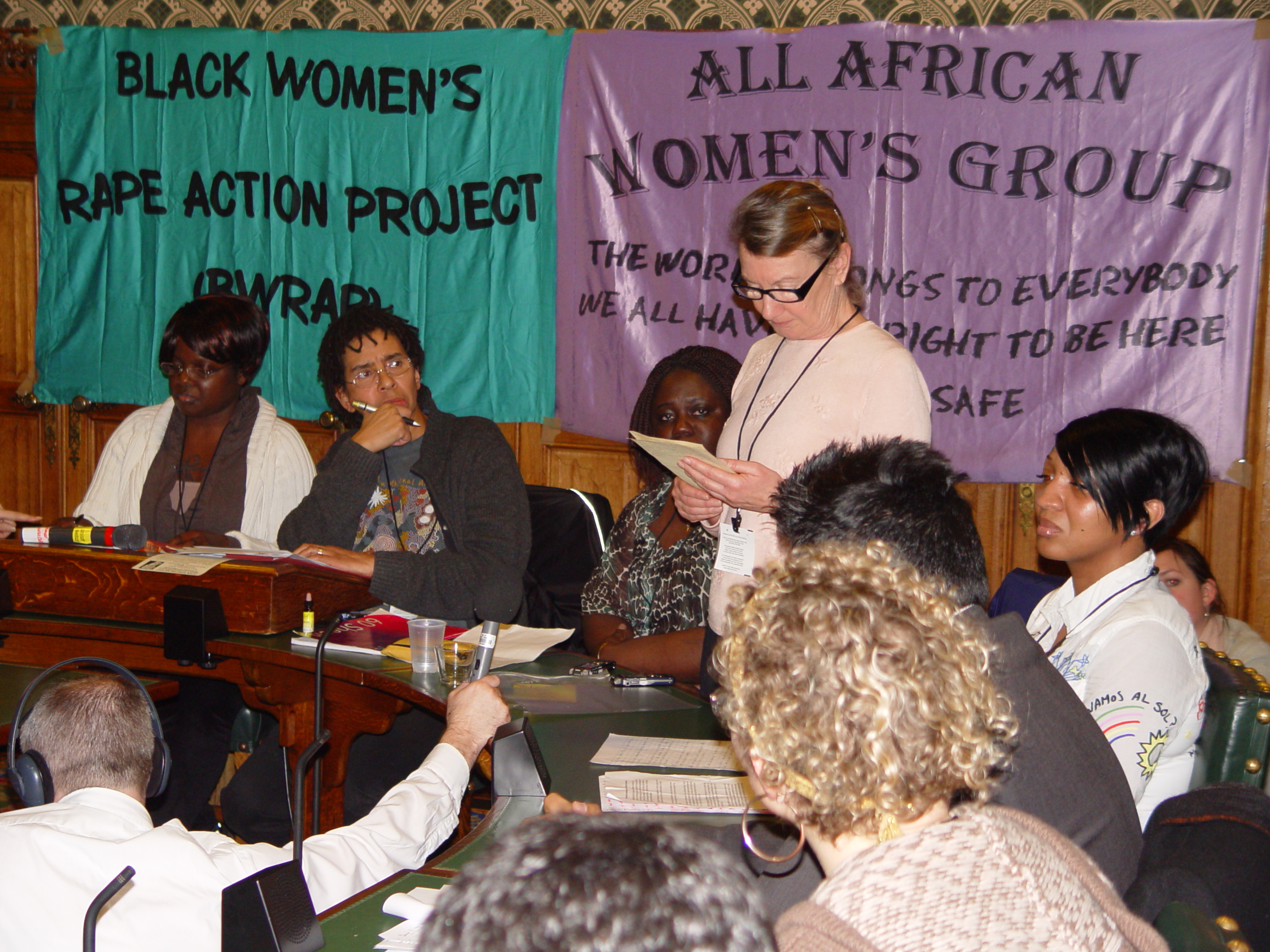
“Making millions out of suffering”
Leila Sami who was twice detained in Yarl’s Wood, described how SERCO, the multi-national running the removal centre, maximised its profits by getting detainees to do jobs previously performed by staff. “For hard cleaning work we are paid only £1 a session. It is slave labour.” She described how women sneaked food to a woman wheelchair-user who was trapped in her room.
During Ramadan women protested against racism from guards and appalling food, winning improvements: “They used to frighten us into not complaining but since we have done this we feel stronger and more protected.” Ms S asked people to protest against SERCO, whose chief executive earns £3000 a day from “slave labour and imprisoning innocent women, children and men who only came here to seek protection.”
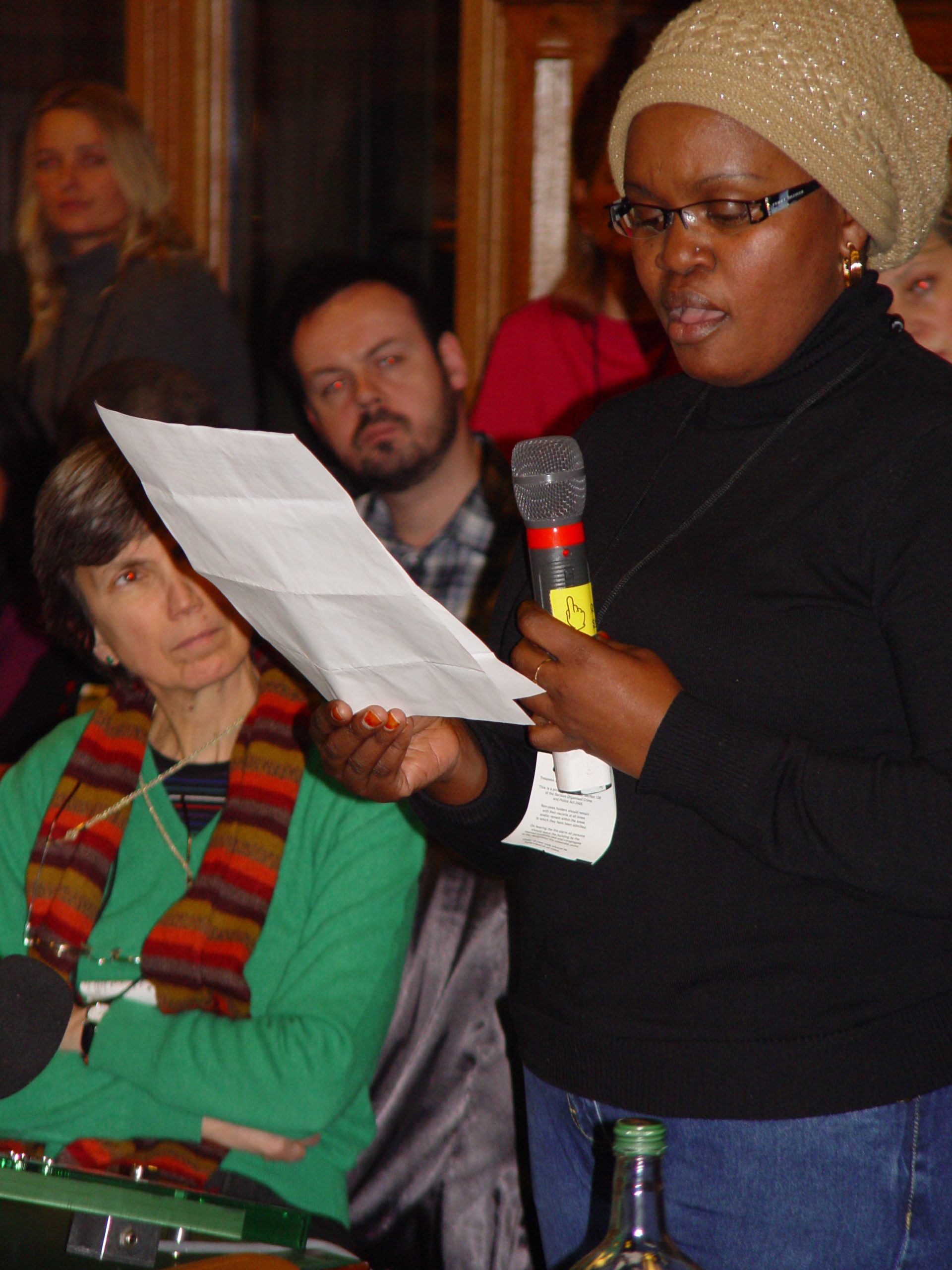
“We can’t sit by while victims of rape and other torture are deported”
Women Against Rape spoke about the obstacles rape survivors face claiming asylum, and some successes including: a UN Resolution recognising rape as a method of war; the introduction of “Humanitarian Protection”, which specifically refers to rape; a ground-breaking case using the UN Convention Against Torture.
They praised the few committed professionals but condemned lazy and negligent lawyers. She criticised those NGOs which assist the government by hiding both the most appalling treatment women experience, and demands for change.
One example, a ‘Women’s Charter’ by Asylum Aid, is presented as encapsulating what women seeking asylum need, yet fails to present concrete demands such as the abolition of the fast track. Instead the Charter repeats government claims about improvements in the treatment of victims of rape or domestic violence in the UK and calls for women seeking asylum to be treated with the same “gender sensitivity”. Drawing on WAR’s work which has helped expose how rape in the UK is systematically deprioritised by the police and prosecution, we denounced this approach as “fundamentally flawed” and a cover-up of the injustices women face.
We countered claims that more training of immigration officials would help, with an account from a disillusioned Home Office case worker who described how the systematic “prejudice and racism” by her co-workers comes “from the top, from the Home Office.”
“There is an aura of ignorance within the legal profession”
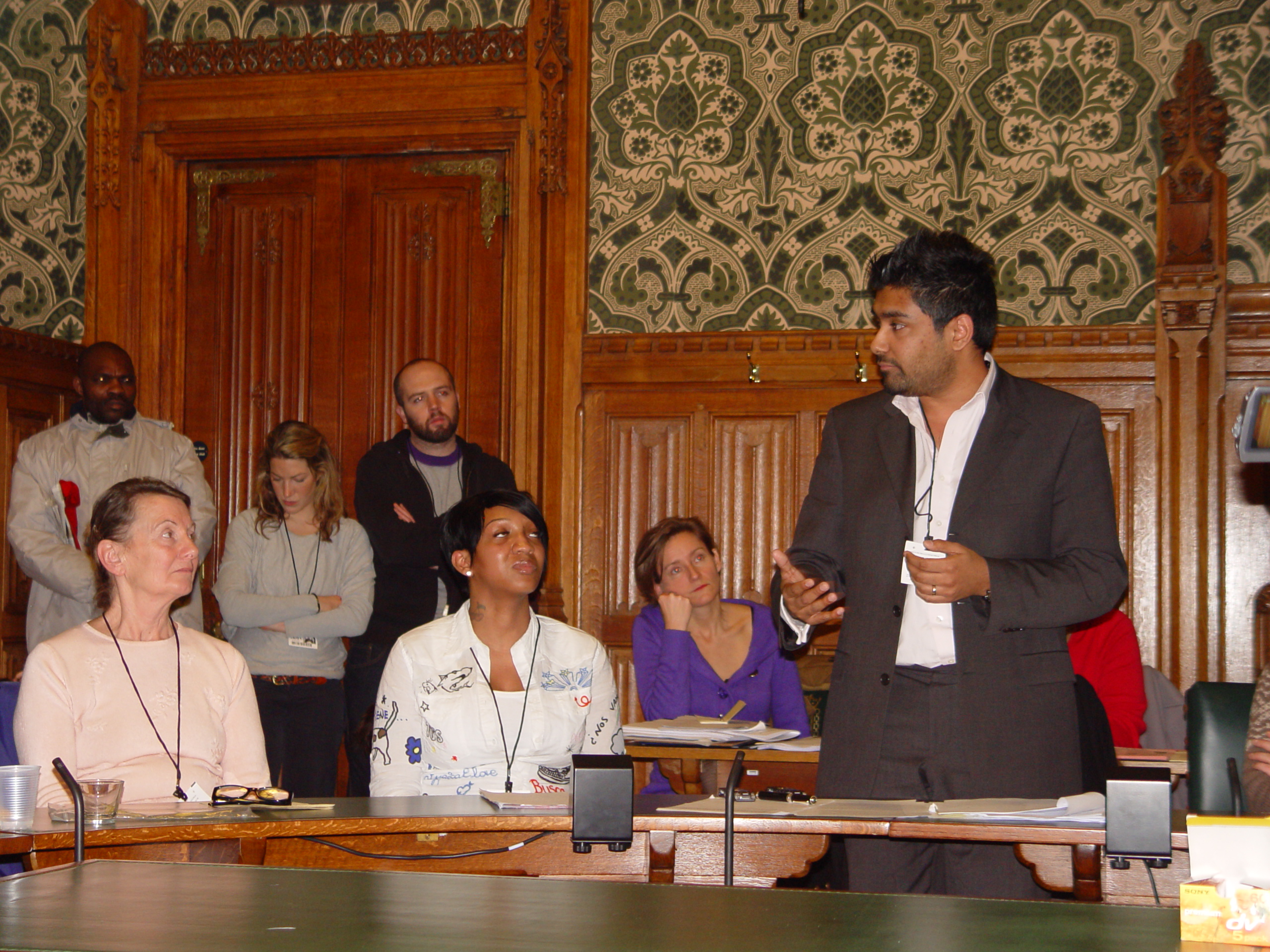
Solicitor Toufique Hossain from Lawrence Lupin, cited legal cases which have successfully challenged unlawful detention. He confirmed women’s experience of poor legal representation: one lawyer told a rape survivor to “keep quiet about it.”
Criminalised, detained and separated from loved ones
Michelle Lewis gave an impassioned speech in defence of herself and mothers like her who, sometimes after years of raising a family in the UK, having been convicted of “crimes of poverty”, are detained, stripped of their right to live in Britain and threatened with deportation. She was held in Yarl’s Wood for eight and a half months and separated from her two young children.
With the support of BWRAP she organised a petition with other mothers to highlight their plight: “If women have done their time they need to be with their families. Some mothers’ children end up being arrested and abused because their mothers are prevented from being with them.”
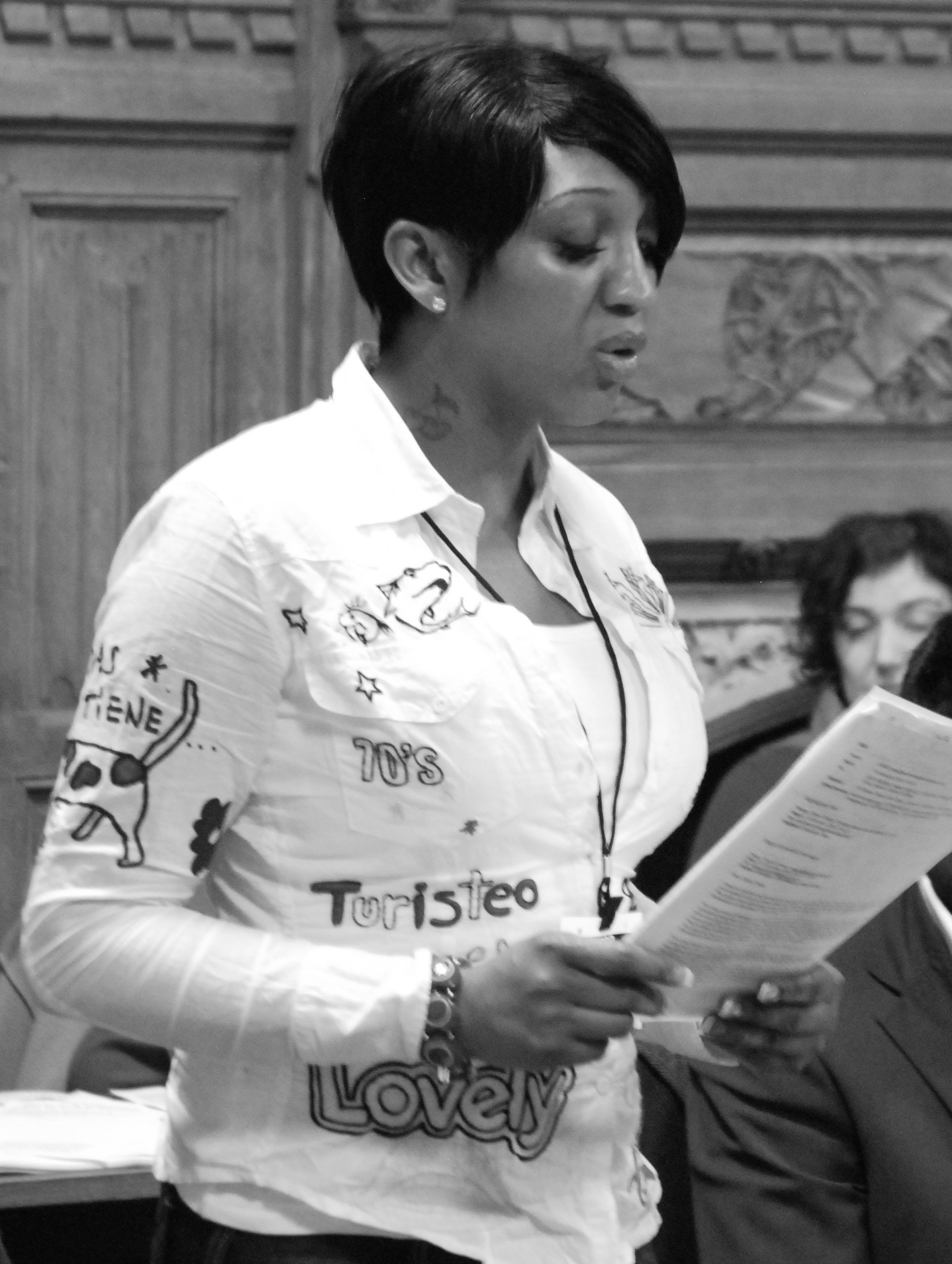
“Ask asylum seekers what we need to survive and be safe”
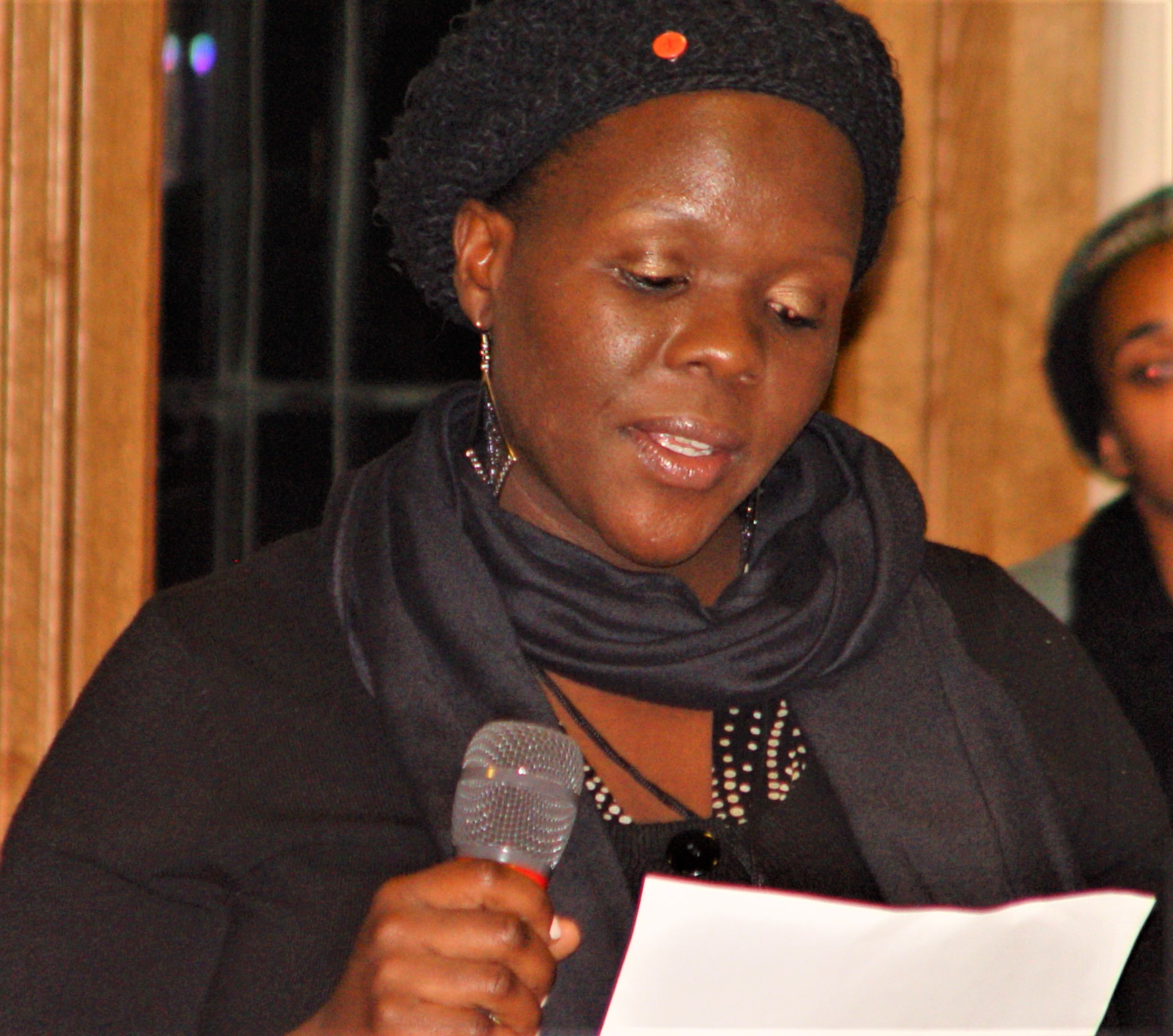
Selina Mofokeng described a horrifying ordeal. She was detained twice, once with a nine-week-old baby, served with five removals and taken to the airport twice, once within the same twelve hours.
Instead of getting help from those paid to do so, Ms Mofokeng faced blatant racism. “My caseworker said he would personally make sure that I left the country. He said that I was the reason he was deprived of an NHS operation on his knees.” Ms Mofokeng also described SERCO’s comic and transparent efforts to spruce up Yarl’s Wood for visits by inspectors or MPs including “re-painting pregnant women’s rooms and staff changing their uniforms from white to lilac for the day.” Risking retribution from guards, she told MPs they were witnessing a sham.
“We are dismissed because we are women, because we are Black and because we are asylum seekers.”
Jeto Flaviah has been at the heart of the Mothers’ Campaign of the All African Women’s Group. “I suffered rape, abuse and torture by government soldiers. I left my three children behind because I thought that it was the only way to save their lives. The pain of a child separated from their mother is not a priority. Children’s charities dismiss us saying it is an asylum issue, not a children issue yet they are at the centre of the campaign to stop children being detained. Does funding and prestige determine which children they decide to help?”
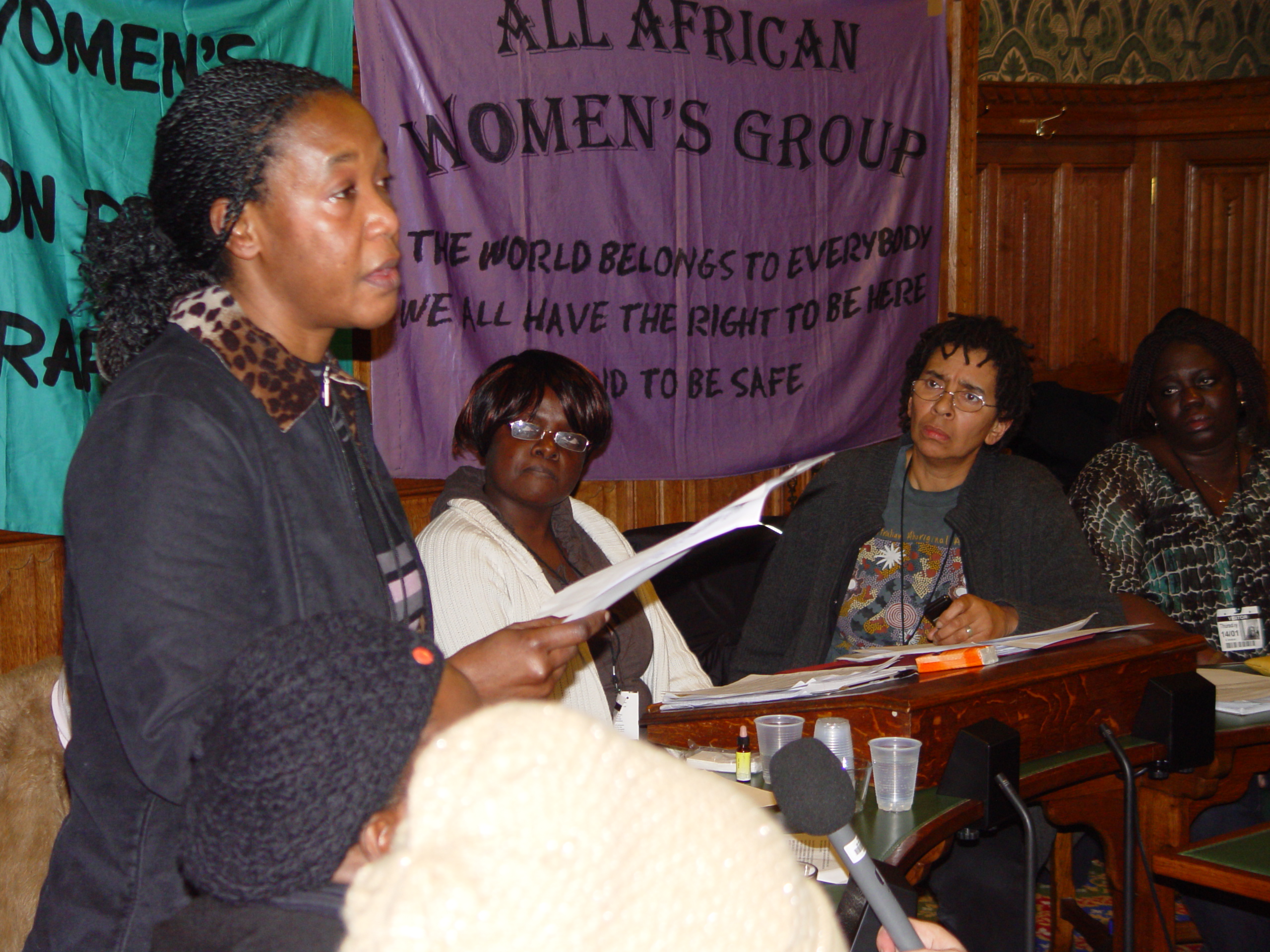
One women asked: “When a woman is being removed, ask her if dignity is her problem.” Another reiterated the speakers’ demand that the fast track be abolished: “You’re in detention, no access to the outside world, you don’t know the system, you’ve been tortured, run away and they’re telling you your case can be decided in ten days! It’s not right”.
Demands put forward by the All African Women’s Group and Legal Action for Women were endorsed by the meeting.
Grace Nawe stunned the audience with her story. When she was four months pregnant she was made destitute. With no home or money and sleeping on night buses and the street, she got severely depressed. When her baby boy was born he was taken from her and put up for adoption by social workers. Heartbroken Grace described how separation by adoption is permanent, so for now she writes letters and hopes that one day her son will come and find her.
Dikeledi Sobukwe, a wheelchair user who was deported to South Africa, sent a message to the meeting describing how she was deported illegally without notice despite protests from her MP and lawyer. At the airport she was handcuffed, dragged on the ground and had her arm badly twisted. When she landed she found that money she had was gone. She is currently in hiding.
Statement from Dikeledi Sobukwe, a wheelchair user who was deported
I was very ill when I was in detention and needed a wheelchair to get around. They wouldn’t give me one so I often had to go without dinner and health care because I couldn’t leave my wing. When other women tried to help me by bringing food back from the canteen, the staff stopped them. They were rude and said I was pretending to be ill. One of my friends in Yarl’s Wood told Black Women’s Rape Action Project about me. They helped me get a lawyer and eventually I was released from detention so I could pursue my asylum claim and take legal action against the way I was treated.
Then a few weeks later, I was suddenly taken back into detention. My lawyer faxed Yarl’s Wood as soon as he heard to say I was meant to have more time to put in my claim. On the same day a man and a woman came to my room with a wheelchair and told me that they were going to take me downstairs to release me. But at reception, I was suddenly told that because the fax from my solicitor wasn’t on letter headed paper, it wasn’t authentic. They took the wheelchair away.
I called my MP because I was afraid they were taking me to the airport. He told me not to worry because my case was not closed and it would be illegal to remove me. But after a while, two men in suits and a paramedic came with the Home Office caseworker who said they were taking me back home. I called my MP again, who asked me to pass my phone to one of the officials. He told them that the removal was illegal because I should have been given three days notice. I only got the removal directions when I was being taken to the bus. My MP wrote to the Home Secretary on my behalf but to no avail.
At the airport I was handcuffed, dragged on the ground, my arm badly twisted and, by the time I was forced on the plane, swollen. I had three men escorting me plus the paramedic who didn’t do anything to stop the abuse. It was only after I was on the plane that he asked me if I needed any help. I told him, “If you didn’t want to help me earlier. I don’t need you now”. The pilot said I could cry and shout as much as I wanted; he couldn’t help and I had to go back to my own country.
I was handcuffed and had my arms and legs tied with a rope. The escorts and paramedics, and some other people who were not in uniform, were making fun of me and abusing me. When the plane landed, I found that the £800 I had in my bag had been taken. I had no passport or other papers as they had been confiscated when I was first taken to detention. Now I have no money, no way of identifying myself in South Africa and because of that I can’t go to the doctor or to the bank. I still have severe health problems and can’t move around especially after the violence I suffered in the removal. It is not safe for me to live in South Africa. Now I am still trying to bring a case under Human Rights Law about the terrible way I was treated whilst I was in detention and when I was removed, and I am trying to get my MP to help.
Report of meeting and more speeches
A woman from Wages Due Lesbians described how the group Stonewall refused to campaign against the homophobia faced by lesbian women seeking asylum. Cristel Amiss responded to a question about whether groups in Africa could help women when they are sent back, by crediting some church groups with providing life-saving support. “No Borders” announced a march against the internal border and holding centre now in place at St Pancras station.
Claims of entrenched hostility by the public to immigrant people were countered by reference to the No School Apartheid campaign which rallied widespread community support against segregated education for asylum-seeking children. David Blunkett, Home Secretary at the time, had described the impact of this movement which made it "virtually impossible to drag a family away from a neighbourhood school. Local papers run local campaigns to stop people being removed".

Selma James, Global Women’s Strike, spoke about the earthquake in Haiti that was at the forefront of everyone’s mind. She paid tribute to Haiti’s contribution to world civilization by taking the lead in ending slavery within its borders and denounced Western governments for backing dictators like Duvalier and fomenting wars and devastation which force people to flee and seek asylum.
Maria Kassaga reported that messages of support had flooded in for the meeting from groups all round the country. Cristel Amiss thanked the AW60 Trust, which covered women’s fares and childcare costs enabling them to fully participate in the meeting. Anthony Wilson from the Trust noted in his support message “. . . what is the Prime Minister doing apologising for sending children to Australia 60 years ago when he is responsible for detaining and deporting them now?” more
The chairs ended the meeting by thanking all those who attended which included a wide range of organisations such as:
All-Party Parliamentary Group on Conflict Issues, CAFOD, Coalition for Independent Action,
Gatwick Detainees Welfare Group, Global Women’s Strike and Women of Colour in GWS, Helen Bamber Foundation, Institute of Education, Islington Law Centre, Legal Action for Women, Lovell’s solicitors, Medical Justice, No Borders, Our Lady help Christians, Payday men’s network, School of Oriental and African Studies, United Nations Association – UK, University of Sussex, Wages Due Lesbians, WinVisible, Women’s National Commission, Women’s Network of Methodist Churches
People were impatient to campaign together to address the horrors they had heard about. Two model letters, a briefing and a set of demands will soon be distributed for people to use to target politicians in the run-up to the election, and SERCO, the multi-national profiteering from detention.